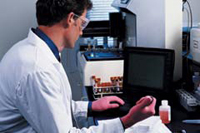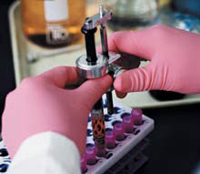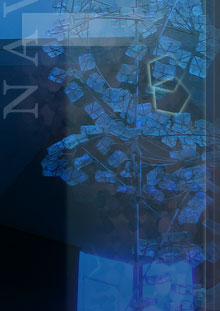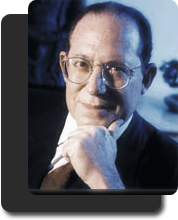From: Business Wire | Date: 5/17/1996
Dr. Haseltine was honored for his role in the creation and management of Human Genome Sciences, Inc. In less than four years, HGS has created over 300 jobs for scientists and managers in Suburban Maryland. Human Genome Sciences now has a market capitalization of over $600 million. The Company is a leader in converting knowledge of genes to new diagnostic, preventative, and therapeutic product opportunities. HGS uses its proprietary knowledge of genes to discover human proteins that may be useful as pharmaceutical products that HGS will develop itself. The Company also partners with other pharmaceutical and biotechnology companies to increase the potential development and commercialization of the large number of product opportunities HGS's work in genomic science creates. The most significant of these are agreements with SmithKline Beecham PLC and Takeda Chemical Industries, Ltd., to develop and market gene-based diagnostic and therapeutic products. The Company has raised over $240 million, both from public offerings and partnerships established with other pharmaceutical firms.
Dr. Haseltine accepted the award on behalf of the employees at HGS who have all contributed to the success of the Company. Dr. Haseltine also said that the award recognizes the vibrant biotechnology industry of the greater Washington area, a rapidly growing sector of the economy, and from which we will all benefit by better health and longer lives.
Other recipients of the award include Katherine Clark, CEO and President of Landmark Systems Corporation, Michael Saylor, President and CEO of MicroStrategy, and Wayne Schelle, Chairman of American Personal Communications.
Human Genome Sciences, Inc. is a company with the mission to develop products to predict, detect, treat and cure disease based on its leadership in the discovery and understanding of human and microbial genes.
Sources for Further Information- Cohen, Jon, "Consulting Biotech's Oracle," Technology Review, October 2001, pp. 70-75.
- Haseltine, William, "Human Genome Sciences"Chmn. & CEO Interview," by Dylan Ratigan, CNBC/Dow Jones Business Video, March 25, 2004.
- Langreth, Robert, "Beyond Talk," Forbes, November 24, 2003, pp. 72-75.
- Stipp, David, "He's Brilliant, He's Swaggering"and He May Soon Be Genomics' First Billionaire," Fortune, June 25, 2001, pp. 100-106.
David and Tom Gardner recently spoke with Dr. William Haseltine, CEO of biotech company Human Genome Sciences (Nasdaq: HGSI), on a recent Motley Fool Radio Show. Read what Dr. Haseltine had to say about the biotech industry, the race to map human genes, and how his company will make money.

Haseltine: Thank you very much for the opportunity.
David: Now, let me begin by asking you my Aunt Wilma question. Are you ready?
Haseltine: OK, I'm ready.
David: OK, If you were sitting next to my Aunt Wilma on a bus and she were to ask you what you did for a living, what would you say?
Haseltine: I'd tell her that I turn human genes into drugs to treat and cure disease, that we've discovered most of the human genes, and we're in the process of discovering cures for many diseases, and those cures will come sooner than she thinks.
David: And if she were to follow up by asking, "When you say sooner than I think, can you give me some rough time frame? Not necessarily for your company, but for this technology overall."
Haseltine: Well, since we're the first to take this approach to bring new drugs to the market, the time frame is our time frame, which is we should have, if all goes well, drugs for sale within two, possibly three years. They will be the first of many. Most of those first few drugs will be from Human Genome Sciences.
David: I notice the mission of Human Genome Sciences, Tom if you tap in, is to develop products to prevent, treat, and cure disease based on the company's leadership in the discovery and understanding of human genes. Tom: Now Dr. Haseltine, biotechnology came in favor on Wall Street back in the late '80s and had an incredible run with a number of stocks doing extremely well, but then a lot of them disappeared from the scene, and you were kind of left with Amgen and Biogen and a few other businesses. But, for the most part, people look back on that time period and say biotechnology flamed out, and now we are seeing the biotech industry coming back into favor. Is there any reason to be worried that what happened before will happen now, and if not, why?
Haseltine: I don't think what happened before will happen again for the leading biotechnology companies. The reason is a pretty simple reason. The companies that got their start in the late '70s and very early '80s were capitalizing on knowledge that had been gained over the past 20 to 30 years. All they really did was supply a new manufacturing technique called bioengineering, where you can take one gene and put it into a different context and basically manufacture the parts at will. They knew pretty much what genes and proteins they wanted. They wanted human growth hormones, human insulin, clotting factor, etc. So the fundamental discoveries had been made. In the '80s and first part of the '90s, people had to do two things -- they had to discover the drugs and then manufacture them, and that turned out to be too hard. The revolution that we created when we created our company, Human Genome Sciences, was to systematize, make it simpler to find new drugs. We did that by discovering virtually all the human genes between 1993 and 1995. That allowed us to sort through those and find which ones would be medically useful. So this revolution is much more broadly based. We've added to the power of biotechnology rapid-discovery tools, rapid-discovery methods as to what we should use for drugs, and that's the real difference. We now have engaged the power of computational biology, robotic instruments, and assembly line methods to speed up and make much, much more efficient the discovery of new compounds. Tom: Dr. Haseltine, when we think about some of the drugs that Human Genome Sciences is producing and has produced, how will they affect our daily lives let's say 10 years from now?
Haseltine: For most people it will be a very pleasant experience. They'll be able to go into their doctor's office and the doctor will say to them, "I am happy to tell you I can do something for your disease this year that I couldn't do last year." Let's take one of the major problems of aging people -- large, persistent sores in their skin. Their circulation breaks down, they may not be as mobile, they develop large, persistent sores. Today, there is not much anybody can do for that. In the future, I believe they will be able to say now there's a new drug on the market. You spray this on every time the bandage is changed and we have a good chance of healing that wound. In terms of people with coronary heart disease -- rather than going into a doctor's office and saying you've got a coronary artery blockage and we're going to have to do open heart surgery, the doctor will say, "Well, come back in a week and we will do an inpatient procedure. We'll put a catheter in your leg and your heart, implant new genes, and you go home and grow your own new blood vessels." Tom: Dr. Haseltine, when I think about this new technology and where the world is headed, I can't help but think about Bones, the doctor on Star Trek, who I remember in one scene in one episode I was watching, said that we were savages as a species a hundred or two hundred years ago because we used to cut into the human bodies to try to heal it. Are we moving into a world where there will be no surgery, where most of the solutions will be some sort of injection or some drug that you can intake based on genetic findings?
Haseltine: I think that is a very good summary of where we think medicine is headed. I've named this new field "regenerative medicine." The first and best choice will be to stimulate the body to regrow itself from the inside out. We think that's a real possibility. That's what a number of our drugs are designed to do. We place them in precise locations with new technologies, non-invasive technologies, and let them stimulate the body to regrow itself. And if we can't do that, our next goal will be to regrow an organ from your own tissues outside the body for implantation. That's the second phase of regenerative medicine. Our own drugs are firmly located in the first phase -- that is, stimulating the body to regrow itself. So that vision of Bones on Star Trek I think is a vision we can help make come true.
David: When you say stimulate the body to regrow itself, is there not a concern on the ethical side of the business that humans will begin using this technology not to regrow, but to grow things that did not exist before and change their biological makeup for, let's say, vanity as a driving reason and certainly other reasons as well. Will it not be just going to the doctor and saying, "Can you help cure this disease?" but also, "Can you make me 6'4" tall -- I'd like to dunk a basketball."
Haseltine: We certainly don't see that in the near horizon. There are certainly concerns and you have to acknowledge those concerns. But I think the way to think about these medicines is you now go to the doctor and he says, "I'm afraid you have diabetes. We can now give you a purified manufactured human substance called insulin." It's grown up and manufactured. It's no longer purified from pigs or other animals. Here a child comes in, the child is destined to not grow very tall. We can now give him growth hormones. It will be a much more natural medicine to enhance what the body can do. It's a much harder task. One we really haven't learned how to approach to actually change what the body is. We can improve the body by restoring health. I don't know if we yet know how to make it better or different from what it already is.
David: Human Genome Sciences stock, HGSI on the Nasdaq, is presently trading at $206. The 52-week low is $14 3/8. So obviously, Dr. Haseltine, you're riding on a huge crest here with the growth of your company. How is HGSI going to make money? What is the business model?

Haseltine: I think in this whole business, the thing to look at is where is the money. For us at Human Genome Sciences, the money is in drugs. Drug sales, pharmaceutical sales, is a really wonderful business. It's a product that people need. It's a product you can protect with patents. It's really a government-sanctioned monopoly for a limited period of time on a very high-margin product. We seek to make money in a very traditional way by making and selling drugs, pharmaceutical products to meet unmet medical needs. Now, in addition to that, we support ourselves and in fact, we've virtually covered all our costs by providing new and powerful discovery tools to other pharmaceutical companies. We also stand to share in their profits very handsomely, I might say, if they should use our tools to create drugs. So there are really two sources of long-term profit for our company -- pharmaceutical sales of drugs we invent, manufacture, and sell ourselves, and very high royalties and revenue participation in products that we enable other large pharmaceutical companies... to discover. Our "business" is one that is well established and very profitable, i.e., the sale of pharmaceutical products.
David: OK, now there are a lot of others today who are patenting genes as they discover them. They range from private company competitors. Celera (NYSE: CRA) is certainly one that has a lot of headlines these days. There is Affymetrix (Nasdaq: AFFX), Incyte (Nasdaq: INCY). There are a lot of competitors in this field, and there is also the government, which is planning on making its information as it decodes the human genome free. How does Human Genome Sciences fit within that large stable of competitors?
Haseltine: We are definitely the king of the gene patent. We are in first for several reasons. We were the first genomic company. We started this whole revolution. We are the first to recognize that we could quickly isolate and characterize all human genes and we could use that knowledge to create medically useful discoveries. We discovered virtually all the human genes by mid-1995. Human genes are something you can only discover first. There is not an endless supply. What people are doing now, the Celeras of the world and other companies and the government, are rediscovering what we already found. We have very, very good evidence that as early as 1995 we had isolated and characterized in our laboratories and in our [Human Genome Sciences databases] 95% of all human genes.
David: So there are some 60,000 to 100,000 human genes? How many are there, because I hear that there are 60,000 to 80,000.
Haseltine: Anyone who tells you 60,000 is definitely wrong. We have isolated, characterized, and sequenced more than 120,000 different human genes. So the number is certainly greater than 120,000. Those people, who estimate lower, simply don't know. We have isolated and characterized them so we're in a very good position to know that there are more than 120,000 of them. Now the next thing we've done, and this distinguishes us from all other genome companies and projects, is we actually go out and make the product of the gene and determine what it does in living biological systems. We've also learned to robotize and automate those processes. So the first discovery that catapulted us to public recognition and into the marketplace was robotic and automated discovery of genes. But that was done for us by early 1995. Since then, for the last five years we've been asking and addressing the question that everybody asks -- what do you do when you have all the genes? What you do is you now robotize and automate the process of biology. What those genes do that's of medical use. We have now filed patents that describe over 7,500 human genes and their medical uses.
David: Let me ask you right there, doctor, when you say there are 120,000 genes and you have patents on 7,500, but you've decoded 95, 96, 97, 98, 99% of it, why is there that numerical disparity?
Haseltine: First thing, you can't just patent a discovery. You have to patent something that's useful. The patent, whether it's a machine or whatever it may be, patent law requires three criteria. Your invention must be new or novel, and that's met by the new sequence or new protein. It must be useful, and your patent must teach people how to use it, and it eventually has to be reduced to practice. It isn't enough to see a new sequence to patent it; you have to have some idea of what it does. The patent office is getting tighter and tighter on what it's going to take to get a patent. We realized that for a long time and we realize that in order to get a defensible patent, something you can use to protect a product, you had to do experiments. What distinguishes Human Genome Sciences from the rest of the pack is that we have set up an automated system to make tens of thousands of proteins at once, to test them in live tissues, in living cells, test them in animals, and manufacture them for clinical use. So our patents have a great deal of information in them and there is nobody that's even close. If you take the kind of patents that we've filed, the rest of the world combined has published patents on less than 2,000 human genes. We're already up to 2,700 and we've filed more than 7,500 of those. Tom: Dr. Haseltine, final question. If I'm an investor who's really looking at this industry for the first time, and I recognize that over the next 25 years -- and it may be fair to say the next century, not just the next 25 years and beyond -- that this is going to be critical to human life and is a radical revolutionary commercial development, but I don't know enough about it. How would you go about learning about these companies, thinking about them as an investor who may have a lot of experience in traditional industries like consumer brands or even consumer technology, but now is looking at an unknown in biotechnology and wants to learn more about it.
Haseltine: There are a couple of things I'd do. One, I'd read your website. I think you've put together a very interesting website and in my opinion, it's one of the best in the business. Second thing I would do is, everyone has friends in universities and science. I would seek out friends to help get some basic grounding in what's happening. Also talk to their friends or their physicians about what they think about how this new medical revolution is going to be. There is tremendous enthusiasm.
David: We feel it as well. It is an amazing time that we are living through and we thank you for taking some time to explain exactly what you've been doing with your business. We wish you the best of luck, and also wish you the best of luck on behalf of the millions of people who are going to benefit from biotechnology and the discoveries and solutions in the next century. Thank you very much, Dr. William Haseltine of Human Genome Sciences Inc.
Return to Top



